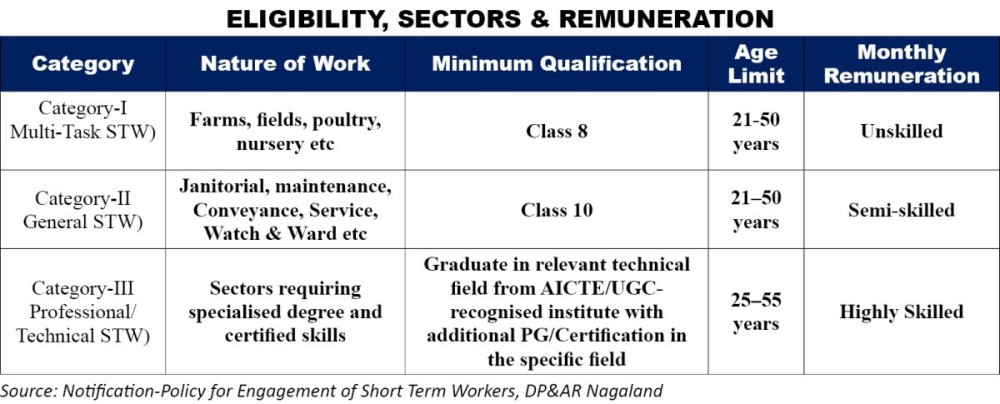
Kohima, May 26 (MExN): The Nagaland Government’s Department of Personnel and Administrative Reforms (DP&AR) has notified a comprehensive new policy for the engagement of Short Term Workers (STWs) across all government departments. The policy, effective from May 2, 2025, follows a Cabinet decision made on February 25, 2025, and is aimed at regulating temporary hiring practices across the state machinery.
According to the notification, no department will be allowed to make any form of appointment outside of regular appointments against sanctioned posts, unless in accordance with the procedures laid down under this policy.
Who are STWs?
As defined in the notification, STWs are individuals engaged on a yearly or seasonal basis for specific projects or urgent departmental requirements. Engagements will be issued for a financial year, ending no later than March 31, and may be renewed based on performance and project needs. Replacements, if any, will only be for the remaining period of the financial year.
During their engagement, STWs will not be transferable between districts or establishments.
Three categories of STWs have been outlined: Multi-Task STW (Category I); General STW (Category II); and Professional/Technical STW (Category III)
Engagement Authority & Registration
The Head of Department (HoD) is authorised to issue engagement orders for STWs, based on proposals from district heads and subject to prior approval from the Government and the Administrative Head of the Department. The number of STWs must not exceed limits approved by the DP&AR and Finance Departments.
The DP&AR will evaluate whether existing departmental staff can meet the required tasks and whether the department has reduced the number of Work Charged and Casual Employees since 2015. The overall number of STWs must remain within the limits previously set by the Work Charged and Casual Employees Commission.
All engaged STWs must be registered in the Personnel Information Management System (PIMS) and classified as Group E. The PIMS system will not allow entries beyond the approved number and will automatically remove STW records at the end of each financial year.
The number of STWs per department will be reviewed every five years by a Manpower Rationalisation Committee.
Eligibility
In addition to the age and educational qualifications (see table) for the three categories of STWs, the notification stated that those engaged in district-level establishments must be indigenous inhabitants and residents of the concerned district. Residency is defined as having lived in the district for at least 10 months annually over the past 10 years, and having completed schooling up to high school within the district.
For state-level establishments, candidates must be Indigenous Inhabitants of Nagaland. The policy also allows up to 50% of posts in state establishments located outside Nagaland to be open to non-indigenous persons, in line with the existing reservation policy.
STWs must be physically fit and capable of performing their assigned tasks, with provisions for reservation under the Rights of Persons with Benchmark Disabilities Act, 2016.
Terms of Engagement
STWs are required to work a minimum of 45 hours per week.
However, their engagement period will not be counted as government service for the purpose of calculating length of service under the Nagaland Retirement from Public Employment (Second Amendment) Act, 2009 and have no claim to regularisation or permanent absorption into government service, the notification stated.
Remuneration will be a fixed monthly lump sum – based on unskilled, semi-skilled and highly skilled rates, and will not be categorised as pay or allowances under the Nagaland Services (Revision of Pay) Rules, 2017.
STWs will not be entitled to Provident Fund, gratuity, pension, medical benefits, or any other allowances, it added.
Engaging departments are responsible for ensuring adequate safety measures and must register all STWs under CMHIS (General) and CMLIS coverage.
Engagements may be terminated with one week’s written notice for reasons such as unsatisfactory performance, misconduct, or violation of terms.
However, those found to have committed a criminal offence or broken the law will be terminated without notice while those terminated are barred from future engagement in any government department.
In the event of death or discharge due to project completion or administrative exigencies, a lump sum equivalent to one month’s remuneration will be paid in lieu of notice.
The DP&AR shall be the final authority to resolve any disputes regarding interpretation of the rules, the notification added.






